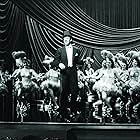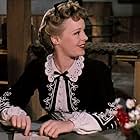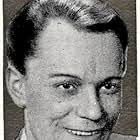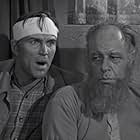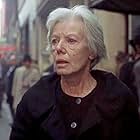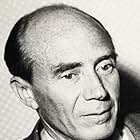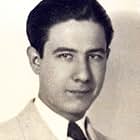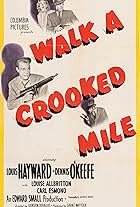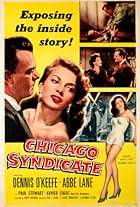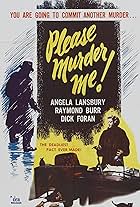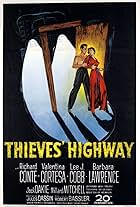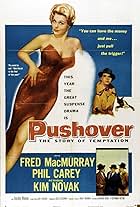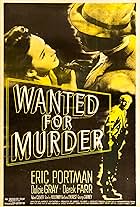A G-man searches for a communist sleeper-cell in Boston.A G-man searches for a communist sleeper-cell in Boston.A G-man searches for a communist sleeper-cell in Boston.
Robert A. Dunn
- Dr. Wincott
- (as Rev. Robert Dunn)
Lotte Palfi Andor
- Anna Kafer
- (as Lotte Palfi)
Wolfgang Zilzer
- August Helmuth
- (as Paul Andor)
Storyline
Did you know
- TriviaA sequence involving two Russian agents meeting covertly in a bar is underscored by Jack Shaindlin's song "I'm Tickled Pink" - the lyrics of which appear to add a comic overtone to the Communist-busting theme of the film. The exact same recording of the song is used in the popular video game "Fallout 3".
- ConnectionsFeatured in Red Hollywood (1996)
Featured review
Produced at the height of the McCarthy purges, a still Stalinist Soviet Union, and the stalemated war in Korea, a movie like this should come as no surprise.
Apart from the political aspect, the movie's a rather plodding account of the FBI breaking up a communist network in Boston. The location filming really helps since it conveys the fashions and street realities of the day. The acting is almost uniformly low-key, as the two sides plot move and counter-move. Neither suspense nor drama is played-up; rather the camera acts more like a detached observer than a player. The docu-drama format also works to establish authenticity, especially to the more controversial political aspects. Overall, this detached element results in a movie more interesting than exciting or suspenseful.
Thankfully, the political side only gets heavy-handed occasionally. Some communists are even portrayed as recognizably human, a departure from the stereotypes of an 'I Led Three Lives" of the TV day. However, characters come and go with such frequency, it's often hard to keep track. Not surprisingly, the FBI is uniformly portrayed as clean-cut, understanding, and efficient, while the lead Soviet agent comes across in contrast as grim and icily efficient.
Despite it's many low-key aspects, the movie remains at bottom a propaganda film, which surfaces in FBI remarks such as, Every loyal American enjoys rights guaranteed by the Constitution (my paraphrase). This, of course, is meant to contrast with the totalitarian Soviets. However, it also conveniently ignores the systematic denial of those rights across the Jim Crow regions of the US, where Blacks were denied even voting rights. By the way, the Soviets made much propaganda use of this fact to their own audiences. My purpose here is not to equate the two Cold War sides, but to point out that the essence of propaganda consists in just such a selective use of facts. As the movie shows, we had ours, and, of course, they had theirs.
Incidentally, George Murphy fans may be disappointed since he gets comparatively little screen time. The real star in terms of screen time is Karel Stepanek, the lead Soviet agent. But few go to the movies to see a non-name like Stepanek. Anyway, in my little book, the 100-minutes holds more interest as an artifact than it does as an entertainment.
Apart from the political aspect, the movie's a rather plodding account of the FBI breaking up a communist network in Boston. The location filming really helps since it conveys the fashions and street realities of the day. The acting is almost uniformly low-key, as the two sides plot move and counter-move. Neither suspense nor drama is played-up; rather the camera acts more like a detached observer than a player. The docu-drama format also works to establish authenticity, especially to the more controversial political aspects. Overall, this detached element results in a movie more interesting than exciting or suspenseful.
Thankfully, the political side only gets heavy-handed occasionally. Some communists are even portrayed as recognizably human, a departure from the stereotypes of an 'I Led Three Lives" of the TV day. However, characters come and go with such frequency, it's often hard to keep track. Not surprisingly, the FBI is uniformly portrayed as clean-cut, understanding, and efficient, while the lead Soviet agent comes across in contrast as grim and icily efficient.
Despite it's many low-key aspects, the movie remains at bottom a propaganda film, which surfaces in FBI remarks such as, Every loyal American enjoys rights guaranteed by the Constitution (my paraphrase). This, of course, is meant to contrast with the totalitarian Soviets. However, it also conveniently ignores the systematic denial of those rights across the Jim Crow regions of the US, where Blacks were denied even voting rights. By the way, the Soviets made much propaganda use of this fact to their own audiences. My purpose here is not to equate the two Cold War sides, but to point out that the essence of propaganda consists in just such a selective use of facts. As the movie shows, we had ours, and, of course, they had theirs.
Incidentally, George Murphy fans may be disappointed since he gets comparatively little screen time. The real star in terms of screen time is Karel Stepanek, the lead Soviet agent. But few go to the movies to see a non-name like Stepanek. Anyway, in my little book, the 100-minutes holds more interest as an artifact than it does as an entertainment.
- dougdoepke
- Oct 16, 2013
- Permalink
- How long is Walk East on Beacon!?Powered by Alexa
Details
- Release date
- Country of origin
- Languages
- Also known as
- Louis de Rochemont's Walk East on Beacon!
- Filming locations
- Production companies
- See more company credits at IMDbPro
- Runtime1 hour 38 minutes
- Color
- Aspect ratio
- 1.37 : 1
Contribute to this page
Suggest an edit or add missing content









